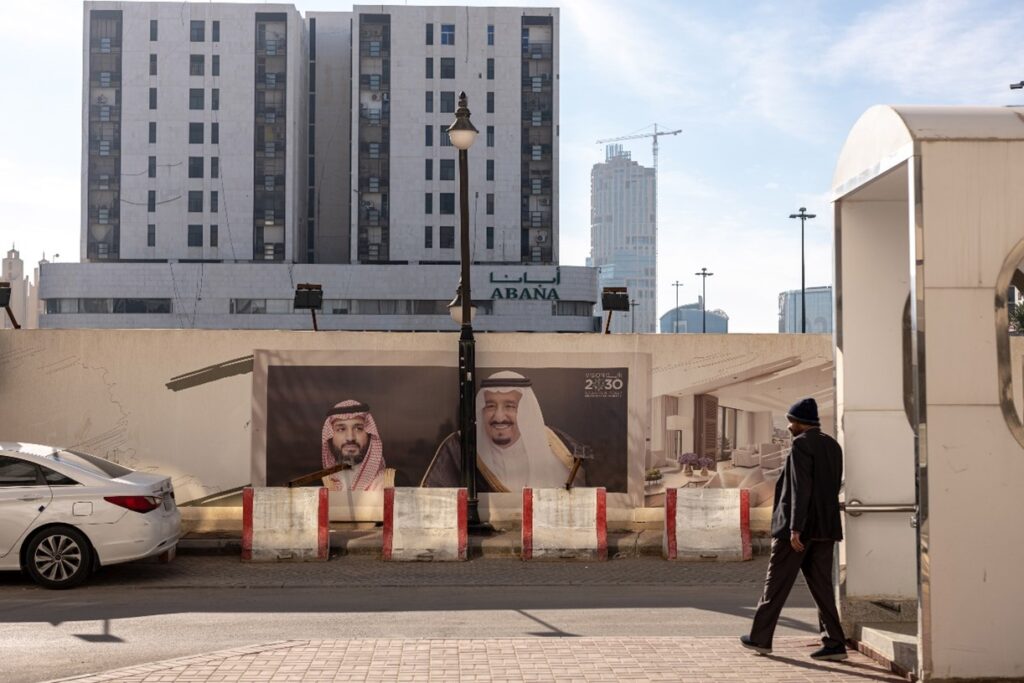Saudi Arabia once more finds itself tightening its belt as it sails through stormy waters. The Saudi Kingdom has a grand plan known as Vision 2030 which is meant to diversify the economy away from oil exports. Now Saudi Crown Prince Muhammad Bin Salman, the country’s de facto ruler has had to scale back the Outlandish schemes by trillions of US dollars.
Saudi Arabia has some pretty grand ideas wrapped up in its Vision 2030 plan: to ditch its reliance on oil exports, diversify its economy, and increase public services. But there have been some bumps in the road, so the country is trimming billions off major projects and shoving others to the back burner. Neom for one: the futuristic city being developed on the Red Sae coast will get 20% less funding this year than originally intended, and plans for a new air line in the area have been grounded. That’s down to a couple of things gone wrong. For starters, foreign investors haven’t been biting: the goal was to raise $100 billion a year by 2030, but they’ve managed only $2.5 billion in the first quarter. What’s more, lower oil prices have made it tough for the country to balance its budget.
Bin Salman also known as MBS is stuck between a rock and a hard place. As the person with the most power in the kingdom after his father King Salman Bin Abdul Aziz, he (MBS) has to find a way to juggle funding for his economic plans. Investors for their part are more interested in long term sustainability rather than grandiosity and temporary profit. In this scenario while cutting back on the more complicated aspects the Crown Prince and his inner circle need to have a rethink concerning what form of project they want for their country. To begin with the Line, Octagon, Trojena etc need to be reconsidered in terms of Neom. The Line especially need to be rethought. At 170 km long, the linear city looks claustrophobic and unnatural in the surrounding desert landscape. To attract investors MBS should have planned the project to be more encompassing of the surrounding area.
Whatever the total cost is, Riyadh is grappling with how to pay for it all. Oil prices have been below where Saudi Arabia needs them to balance its budget – meaning it faces years of deficits – while foreign direct investment has been slow to materialize outside the oil and gas sector. That’s prompted a race for cash. My colleague Abeer Abu Omar added up the numbers that show the kingdom has already raised nearly $90 billion this year. That includes close to $50 billion from international dept sales by sovereign and cooperate entities, propelling the kingdom to pole position among emerging-market borrowers, plus cash from the Public Investment Fund’s divestments of US Stocks, based on Bloomberg data.
The Saudi monarchy could be mired in dept if it doesn’t pull its act together. Both the regime and MBS need to review their ambitions for the country and what they want to achieve for future generations. Building a ski-resort, sports stadium, and other sports and wellness facilities as part of Trojena, Neom to host the Asia Winter Games in the mountains of Tabuk province could bankrupt the Saudi state. This can happen if there is no income returns for the proceeds of hosting such an event. Riyadh is now going through a chaotic process of privatisation. Investment in renewable energy such as wind and solar is still low as it does not yet generate lucrative returns. Insisting that a linear metropolis known as the Line form the basis of the economic vision was going to be a mechanism for disaster.
While the flurry of bond sales creates questions about how much Saudi risk markets can absorb, the kingdom’s “second to none in the world” in terms of capacity to bear more dept, Goldman Sachs’ Middle East and North Africa economist Farouk Soussa told Jennifer Zabasajjer on Bloomberg TV. “From a balance sheet position, we are extremely relaxed,” he said, pointing to the kingdom’s 30% dept to GDP ratio and large foreign exchange reserves. And as Riyadh’s ambitions contend with new fiscal realities, we’re seeing signs of cutbacks. Last week, my colleagues Mathew Martin, Christine Burke and Zainab Fattah reported that authorities are likely to slash billions of dollars in spending on some of their biggest development projects, while placing others on hold.
From above we can see MBS is trying to balance his economic policies on a limited budget which have become as cumbersome as being a tightrope walker in a circus. The Crown Prince’s taste in eccentric architecture and design could prove to be his undoing. At the moment he wants to bring about radical change while repressing dissent. This policy doctrine has created many enemies and rivals for MBS. If the Crown Prince doesn’t scale back on his heavy-handed approach to having his way he can face being toppled. MBS is not the most popular figure in the desert kingdom but the basis of him maintaining power is he controls access to his dementia plagued father the king. So, MBS’s grip on power remains as long as King Salman is alive.
Only time will tell how MBS manages to turn his fortunes around or face a dynastical coup.
Article written by:
Yacoob Cassim
Journalist at Radio Al Ansaar






